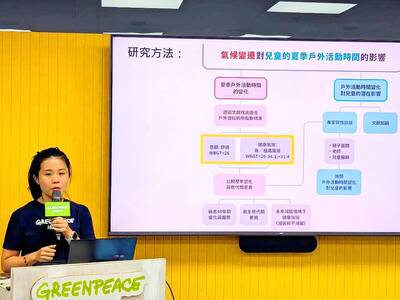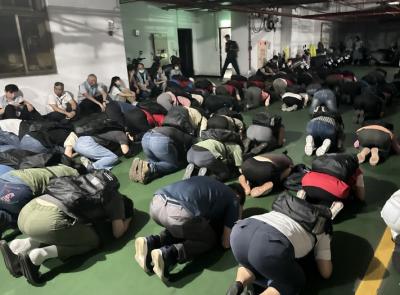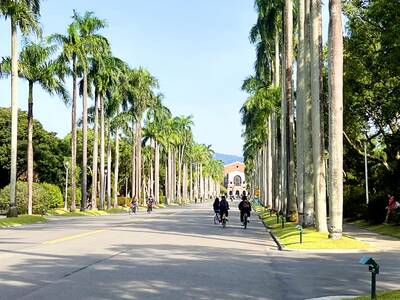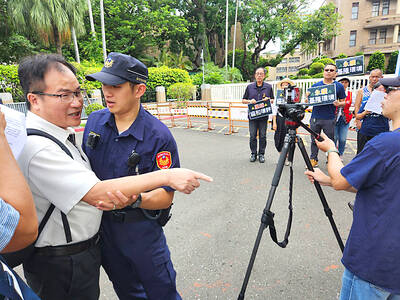Central Election Commission (CEC) official Chao Shu-chien (趙叔鍵), who was recommended to the CEC by the People First Party, was fined NT$400,000 for making a pro-Ma Ying-jeou (馬英九) statement on a TV political commentary show a day prior to the presidential election.
“If [Democratic Progressive Party presidential candidate] Frank Hsieh [謝長廷] wins the election, Taiwanese will continue to suffer as they have for the past eight years,” Chao said on TVBS on March 21 last year.
According to the law, election authority officials are barred from making partisan comments or endorsing a particular candidate.
Chao denies what he said was inappropriate.
“I have my freedom of speech too, especially when I was introduced on the show as a professor, not as a CEC member,” he said in a news footage broadcast by news channel SET-TV yesterday.
Chao appealed to the Administrative Court, but was turned down.
Meanwhile, an enthusiastic voter, Lee Huang-lei (黎煌雷), could be fined NT$500,000 by the CEC for sending a 50-word text message on the day of the presidential election last year soliciting support for Ma.
“The President and Vice President Election and Recall Act [總統副總統選舉罷免法] prohibits any campaign or promotional activities for a candidate,” CEC secretary-general Teng Tien-yu (鄧天祐) said yesterday.
“Violators can be fined between NT$500,000 and NT$5 million [US$154,000]. We gave him the lightest penalty because the violation was minor,” Teng said.
Lee sent a text message to 185 friends and relatives urging them to vote for Ma on March 22 last year.
One of the recipients of the text message reported the matter to the CEC, which decided to fine Lee at the end of last year, a CEC official said on condition of anonymity.
Lee appealed to the Cabinet’s Administrative Appeal Commission, but he was turned down, the official said.
If Lee does not make another appeal within the next two months, he will have to pay the fine.

The government should improve children’s outdoor spaces and accelerate carbon reduction programs, as the risk of heat-related injury due to high summer temperatures rises each year, Greenpeace told a news conference yesterday. Greenpeace examined summer temperatures in Taipei, New Taipei City, Taoyuan, Hsinchu City, Taichung, Tainan and Kaohsiung to determine the effects of high temperatures and climate change on children’s outdoor activities, citing data garnered by China Medical University, which defines a wet-bulb globe temperature (WBGT) of 29°C or higher as posing the risk of heat-related injury. According to the Central Weather Administration, WBGT, commonly referred to as the heat index, estimates

Taipei and other northern cities are to host air-raid drills from 1:30pm to 2pm tomorrow as part of urban resilience drills held alongside the Han Kuang exercises, Taiwan’s largest annual military exercises. Taipei, New Taipei City, Keelung, Taoyuan, Yilan County, Hsinchu City and Hsinchu County are to hold the annual Wanan air defense exercise tomorrow, following similar drills held in central and southern Taiwan yesterday and today respectively. The Taipei Mass Rapid Transit (MRT) and Maokong Gondola are to run as usual, although stations and passenger parking lots would have an “entry only, no exit” policy once air raid sirens sound, Taipei

Taipei placed 14th in the Quacquarelli Symonds (QS) Best Student Cities 2026 list, its highest ever, according to results released yesterday. With an overall score of 89.1, the city climbed 12 places from the previous year, surpassing its previous best ranking of 17th in 2019. Taipei is “one of Asia’s leading higher-education hubs,” with strong employer activity scores and students “enjoying their experience of the city and often keen to stay after graduation,” a QS staff writer said. In addition to Taipei, Hsinchu (71st), Tainan (92nd), Taichung (113th) and Taoyuan (130th) also made QS’ list of the top 150 student cities. Hsinchu showed the

Environmental groups yesterday filed an appeal with the Executive Yuan, seeking to revoke the environmental impact assessment (EIA) conditionally approved in February for the Hsieh-ho Power Plant’s planned fourth liquefied natural gas (LNG) receiving station off the coast of Keelung. The appeal was filed jointly by the Protect Waimushan Seashore Action Group, the Wild at Heart Legal Defense Association and the Keelung City Taiwan Head Cultural Association, which together held a news conference outside the Executive Yuan in Taipei. Explaining the reasons for the appeal, Wang Hsing-chih (王醒之) of the Protect Waimushan Seashore Action Group said that the EIA failed to address